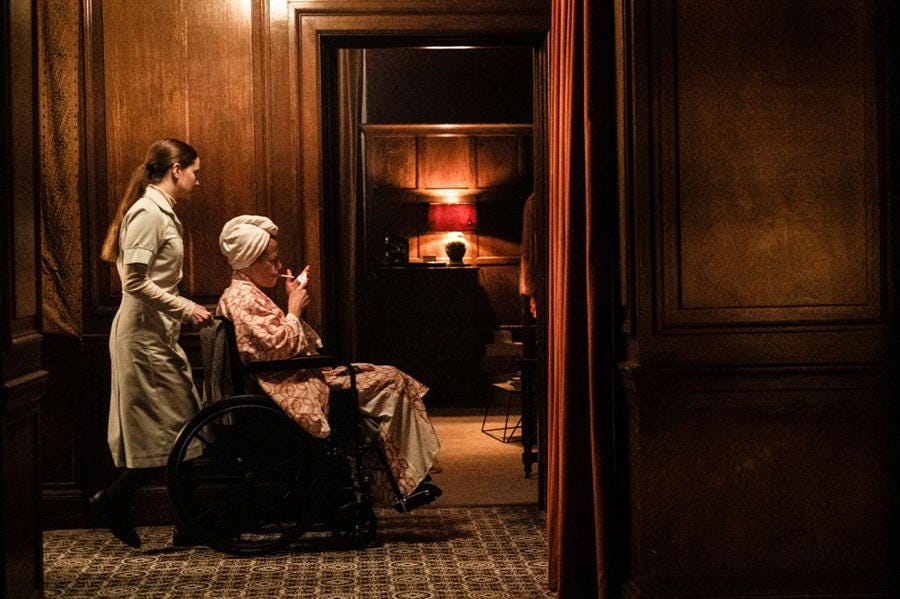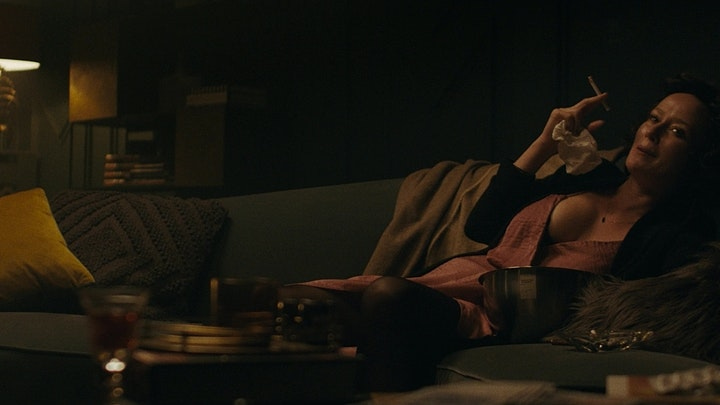What better way to celebrate the UK release of Rose Glass’s excellent (and very, very physically sticky) sophomore feature, Love Lies Bleeding, than giving some love to her debut?
Spoilers be with you, of course. And trigger warnings for mention of sexual assault, gore and one of the most horrifying endings to any film in the last ten years, probably.
Saint Maud (2019)
Written and directed by: Rose Glass
Starring: Morfydd Clark, Jennifer Ehle, Lily Frazer, Lily Knight, Marcus Hutton, Turlough Convery, Rosie Sansom
Running time: 84 minutes
Original release date: 9 October 2020 (…)
the plot, in brief
Traumatized after failing to save the life of a patient in her care, a nurse named Katie (Clark) undergoes a drastic life change. Now a devout Roman Catholic referring to herself as Maud, she works as a palliative care nurse in an English seaside town.
Maud is assigned to care for the hedonistic former dancer and choreographer Amanda Köhl (Ehle), who is terminally ill with stage four lymphoma. Maud believes that she has been sent to save the soul of the atheist Amanda, and soon her devotion to her task becomes dangerously obsessive…
but first
I love it when a movie (or TV show) starts with the Studio Canal ident, it means I’m either about to watch a lovely, wholesome movie like Paddington or I’m about to hear Mads Mikkelsen say the words “Previously, on Hannibal” and there is no in-between and I think that’s beautiful tbh.
little saviour
There is a telling shot at the start of the film, one that - for me, at least - best sets the scene for the inner life of our main character. We start with a wordless introduction, in which a blood-soaked, traumatized nurse sits in the corner of a hospital room, her patient dead and the sickly yellow lights flickering. She looks up at the ceiling, observing a cockroach crawling into a corner. A brief, almost unreadable look crosses her face. Her arms are outstretched, wrists up. The shape of her fades to black along with the rest of the screen.
Titles. SAINT MAUD, white over black, with the white slowly fading into red, fading into a pot of tomato soup, slowly bubbling to the boil. We can hear from somewhere an argument fade in, the pot of soup still boiling. The camera cuts to a small, barebones apartment. A woman - the same nurse from earlier, although we cannot see her fully just yet - walks into frame and calmly shuts the window, bringing silence back to the apartment.
This is Maud - at least that is her name when we meet her properly. As played by Welsh actress Morfydd Clark, rather than becoming the embodiment of that boiling pot, Maud already is halfway there. She is a raw nerve, entangled deep in loneliness and heartache, talking to God and asking to show her what it was she was “saved” for.
Maud works as a private care nurse, and when we properly meet her, she is on her way to a new posting, walking through a nameless British seaside town up to a remote, Shirley Jackson-esque hillside house. There, she’ll meet her new charge, Amanda Köhl - a celebrated former dancer and choreographer (we do not get that much verbal backstory for Amanda, but Maud does find multiple books written by her, as well as several posters for her shows) who is both actively dying and actively in fear of what is coming for her.
Jennifer Ehle as Amanda is a formidable counterpoint to Maud’s brittle, yet fiery presence. When Maud first arrives at the house, she gets a handover from her predecessor, who describes Amanda as “a bit of a cunt”, which is quite frankly perfect. Yes, Amanda is scared and says as much to Maud, but there is a red thread of sarcastic bluntness to her, a sense that what Maud comes to perceive as a genuine need for her soul to be saved is in fact just an amused fascination with this strange creature assigned to her. When she calls Maud “her little saviour”, Maud takes her very seriously, and the idea forms in Maud’s head that what God had planned for her was to save Amanda’s soul.
And it is to Rose Glass’s credit that this possibility is never disavowed.
physicality
The way Maud’s devotion manifests is gruelingly physical. When Amanda asks her if she “gets a response” when she prays, Maud replies that, while she does hear His voice sometimes, most of the time it’s like God’s presence is physically in her or near her, guiding her. When she leaves Amanda’s room to go to bed that night, we get to see for the first time what that looks like; a twisted mix between sexual ecstasy and extremely painful seizure as Maud falls to the floor and writhes.
In the very next scene, Maud prays in front of her makeshift altar, first dropping a number of popcorn kernels to the floor before kneeling down, knees bare. There is an audible crunch on the soundtrack, but Maud seems to not feel the pain.
Glass is a filmmaker who is curious to explore, in the words of Anna Bogutskaya, the clash between a character’s bodily reality and the vast, often poisonous possibility of their mind. In Saint Maud, we are stuck in the loneliness with our main character - if I was to describe what it feels like, it’s a lot like the scene in Suspiria (1977 flavour) in which Stefania Casini’s character Sara falls into the room filled with barbed wire (which, to stray off topic for a few seconds, WHY IS THERE A ROOM FILLED WITH BARBED WIRE JUST RANDOMLY IN THIS SCHOOL WHAT THE ACTUAL FUCK IS GOING ON THERE) and tries desperately to escape but just gets more and more tangled and scratched and hurt.
the body is the story
If we look at Saint Maud from a storytelling perspective, it is a perfect example of my theory that horror is the truest cinema of the senses. In the hands of another filmmaker, perhaps we would have had more narrative between Maud and Amanda, a full backstory for Maud and what actually happened on the night she lost the patient. We would have had, perhaps, very clear delineation between the real and the unreal, the good and the bad.
In Rose Glass’s hands, rather than a traditional plot, we focus squarely on the fight between body and mind in Maud. In that way, the body is the story. At Amanda’s birthday party, Amanda rather cruelly puts Maud on the spot by calling out how she had told Amanda’s companion Carol (Lily Frazer - the exact nature of their relationship is not explained but we see both Amanda and Carol having sex and Carol leaving the house with a handful of cash so it is possible their relationship has a transactional nature) to leave, as she believed distractions of the flesh would stand in the way of Amanda’s salvation. Amanda asks “is she a bigot or is she jealous”, but I would think that the truth is much more complex: Maud is laser focused on what she sees as her mission to save her charge’s soul, because of that pivotal night where she was not able to save her patient despite trying so hard. Several times in her prayers, she asks God what He has “saved her” for, and she wants so badly for it to be Amanda that her humiliation by her is like a slap in the face.
Which she replies to with an actual slap in the face.
The scene at the party is particular evidence of the cinema of the senses theory; Maud desperately tries to leave but the party guests are honing in on her, mocking her, draping a cover of her head and calling her Saint Maud. It’s as visceral as the movie’s scenes of body horror, Maud’s loneliness choking her until she snaps and slaps Amanda right across the face.
i fail to believe
Fired from her job, alone in her minimalist, decrepit apartment, Maud is lonelier than ever. An attempt to go out and seek companionship ends in even more heartache, as Maud is rejected by the world around her, and ends up going home with a man. She tries to have sex with him but is forced to stop as she suffers vivid flashbacks of trying to save her patient. The man, while pretending to be sympathetic, rapes her, and whatever was left of Maud as a person completely snaps as she dissociates. Glass plays with the camera in the next few scenes, shooting upside down, letting us into Maud’s deterioration.
At home, Maud begs God to not let her fall, to guide her, and it is this desperate prayer that leads to one of the film’s most physically visceral scenes. As fireworks burst outside, Maud throws up, falls to the floor and is helpless as her body twists and turns sickeningly, foam in the corners of her mouth.
And then, everything goes quiet, as her body lifts from the floor and she levitates in mid-air. You can see the fireworks through her window and it is clear that this moment is pivotal.
The next morning, Maud cleans her flat and practices mortification of the flesh by way of a spugna. As she limps through town, face beatific, she eventually runs into Amanda’s current nurse (who she spots with Amanda from afar earlier on, the two seemingly having a nice, easy connection) and deduces Amanda might be actively dying.
Maud formulates a plan, but is briefly derailed in her preparations by Joy visiting her flat; this scene really hammers home how disconnected Maud is now, because Joy actively tries to reach out to her former colleague and apologize for not being there for her in her time of need, but Maud, or Katie, is no longer there.
Dressed in a makeshift robe and rosary beads, she makes her way to Amanda’s house, in a final attempt to save her soul. Amanda, however, tells her that while she’s seeking forgiveness for mocking Maud, she feigned an earlier moment where it looked like they were experiencing God’s presence together, and that she does not believe God is real.
A horrified Maud recoils as Amanda is seemingly possessed by the Devil, hurling her across the room, mocking Maud for feeling the need to prove her faith. In an act of final disconnection, Maud stabs Amanda to death with a pair of scissors.
Drenched in blood, she returns home and sleeps before redressing (and seemingly spouting a pair of glowing wings) and wandering onto the beach in the morning. Before a horrified crowd, she douses herself in acetone. For a brief moment, it looks like she is a shining angel, with onlookers kneeling in awe at the sight of her.
And then, in the final moment of the movie, the scene smash cuts to a burning Maud screaming in agony before the film cuts to black.
It is an ending that genuinely left me gasping for air, and one that you WILL remember for a long time afterwards, mainly because it happens 1) very suddenly and 2) in the absolute last possible seconds of the film and 3) is so visually upsetting that I needed to stand up and take a walk around my flat for a good minute and a half afterwards.
Saint Maud, if you didn’t already deduce from its original release date, got completely shafted by the pandemic. My hope is that, with Love Lies Bleeding’s release, more people see this movie and recognize it for what it is: a truly bold statement of intent by a very unique new voice in horror.








